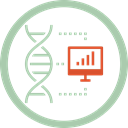
LIDE is a contract research organization (CRO) specializing in preclinical oncology studies, offering a full suite of drug evaluation services, blending best-in-class methods with novel, state-of-the-art techniques.
- Target Identification and Validation
- Drug Evaluation and Pharmacology
- Translational Medicine
- Clinical Biomarker identification
Our offering includes traditional, gold standard methods as well as LIDE-unique techniques that ensure we’re delivering quality science while being efficient with our client’s time and dollars. Each study is available as a stand-alone service or as part of an end-to-end preclinical, IND-enabling program. Each engagement begins with a complementary consultative call with our science team, so that we can match your study needs with an exact study plan.
With over 12 years of experience specifically in the preclinical space, and experienced PhD scientists, lab technicians and bioinformaticians, you can trust LIDE with your study needs from design through execution.

Best in Class Models for Quality Results
- 1900+ mouse models across 50 oncology indications
- PDX | CDX | 3D TCA | Spheroids | Organoids
- Hematology and Brain Metastasis Models
- In Vitro | Ex Vivo
- Pharmacology | PKPD
Reliable science requires quality inputs.
LIDE’s translational platform offers us daily access to fresh tumor samples. The most interesting tissues are immortalized in LIDE's 1900+ patient-derived mouse models and 100+ proprietary, conditionally reprogrammed cell lines, giving our clients access to unique, patient-consented, highly characterized, low-passage tumors. Many of our models are accompanied with patient treatment history, sequencing analysis, naturally derived drug resistance and genetic alterations.
While other contract research organizations (CROs) offer models too, LIDE's models are the closest you can get to original cancer cells.

Novel, Proven In-Vivo Methods for Fast Feedback
- MiniPDX for targeted therapy
- IO-FIVE for immunotherapies
Reliable science requires efficiency of resources
A company built by scientists, LIDE prides itself in pushing innovation to meet the demands of drug R&D while still delivering reliable results. There is a gap in typical preclinical oncology R&D pipelines, between fast but clinically unreliable in-vitro studies, and more expensive and time-intensive PDX mouse studies. Our proprietary MiniPDX and IO-FIVE tests provides results in 7-14days, offering fast and actionable in-vivo feedback for your go or no-go development decisions. can get to original cancer cells.

Advanced OMICs and Bioanalytics
- WES | RNAseq | Proteomics
- Flow Cytometry | IMC (Imaging Mass Cytometry)
- Biomarker Identification
Reliable science requires clarity of data
LIDE's in-house bioanalytics team offers seamless transition from lab studies to data analysis, offering multi-omics approach with standard genomic analysis paired with advanced transcriptomics and single molecule proteomics. Our flow-cytometry and IMC experts can help you evaluate drug response using neighborhood statistics, phenotypic profiling, cluster in-site mapping and morphology analysis.
Get started with our ready-to-use panels that are optimized to detect the most popular biomarkers, or let us customize to your specs.

Robust Immuno-Oncology Studies
- ADCC & ADCP Assays
- Syngeneic & Humanized Models
- NCG+Tumor/PBMC reconstitution | Novel co-inoculation
- Effector engineered T/NK | Car-T | ADC | oncolytic virus
LIDE provides a one-stop solution with various immune-oncology approaches to support most biologics research in immunotherapy. Our offering ranges from proof-of-concepts using murine syngeneic models to donor-selected classic PBMC humanized CDX/PDX models for more promising agents. We also have novel co-inoculation models to overcome GvHD issues.

Target Identification and Validation
- Pro-siRNA | CRISPR screening
- Bioanalytics
LIDE leverages our access to patient samples, their matching cell lines and mouse models with the capabilities of our in-house bioanalytics team to support target identification and validation at scale. Bioinformatic analysis of genomics and transcriptomics data helps identify differential genes and biomarkers that are then validated in-vitro by chemical compounds and individual siRNAs, followed by in-vivo validation via CRISPR KO cell transplant into immune-deficient mice.
Engage as a partner in our ongoing pipeline of targeted areas, or leverage our platform for your own interest areas.
